Creating a Supplement Stack for Motivation, Energy, and Anti-Procrastination
Introduction
Motivation isn’t just about mindset—it’s about chemistry. When your brain’s energy systems, hormones, and neurotransmitters are in balance, motivation feels natural. When they’re off, even simple tasks can feel impossible. The truth is that procrastination, burnout, and lack of focus are often symptoms of neurochemical imbalance: low dopamine, high cortisol, unstable energy, or poor sleep recovery.
Supplements can help restore that balance. The right stack can sharpen your focus, sustain energy, reduce mental fatigue, and quiet the anxiety that fuels avoidance. Think of this as a biochemical toolkit for consistent action—so you don’t have to force motivation every morning.
Looking for supplements for This? Click here.
The Motivation Equation 🧠

Motivation emerges when three systems work together:
Dopamine – the “go” signal that creates drive and anticipation.
Cortisol – the stress hormone that provides urgency, but in balance.
ATP (cellular energy) – the physical fuel that powers thought and movement.
When dopamine is low, nothing feels rewarding. When cortisol is too high, focus collapses into anxiety. When energy falters, discipline evaporates. A good supplement stack doesn’t just stimulate—it balances these three systems for sustainable motivation.
Core Supplements for Motivation and Anti-Procrastination 🌟
Let’s build your foundation—supplements that directly support the brain’s drive and focus systems.
L-Tyrosine: The Dopamine Precursor 🎯
L-Tyrosine is an amino acid that your brain converts into dopamine and norepinephrine. When you’re stressed or overworked, dopamine levels drop quickly—leading to fatigue, apathy, and distraction.
Why it helps: L-Tyrosine replenishes dopamine stores and helps you feel mentally sharp, especially under pressure.
Typical dose: 500–1,500 mg before demanding tasks or workouts.
Rhodiola Rosea: The Adaptogen for Motivation 🌿
Rhodiola helps your body adapt to stress while enhancing dopamine and serotonin balance. It’s known to boost mood, stamina, and cognitive clarity.
Why it helps: It prevents burnout and emotional crashes that lead to avoidance.
Typical dose: 200–400 mg standardized to 3% rosavins, 1% salidroside (morning).
Omega-3 Fatty Acids: Brain Fluidity and Dopamine Sensitivity 🐟
EPA and DHA improve dopamine receptor function and membrane flexibility, ensuring your motivation signals “land” properly.
Why it helps: Enhances clarity, mood, and sustained focus.
Typical dose: 1,000–2,000 mg combined EPA/DHA daily with meals.
B Vitamins: The Neurotransmitter Builders 🔋
B6, B9 (folate), and B12 help synthesize dopamine, serotonin, and GABA. They also regulate homocysteine, an inflammation marker tied to fatigue and mental fog.
Why it helps: Supports both energy metabolism and motivation chemistry.
Typical dose: One high-quality B-complex per day with breakfast.
Magnesium Glycinate: Calm Focus and Cortisol Control 🌙
Magnesium regulates stress response, GABA function, and sleep recovery. Low magnesium can amplify anxiety and restlessness, sabotaging consistency.
Why it helps: Keeps your brain relaxed yet alert—ideal for anti-procrastination.
Typical dose: 200–400 mg nightly.
Energy Stack: Fueling Your Brain Without the Crash ⚡
Energy is chemistry, not caffeine dependency. To sustain focus throughout the day, you need mitochondrial support—the system that creates ATP, your body’s energy currency.
Acetyl-L-Carnitine (ALCAR): The Brain Energizer 🚀
ALCAR improves mitochondrial energy and neurotransmitter efficiency. It crosses the blood-brain barrier easily, supporting both mental and physical stamina.
Why it helps: Sharpens focus, combats mental fatigue, and improves alertness.
Typical dose: 500–1,000 mg in the morning.
CoQ10 (Ubiquinone/Ubiquinol): Cellular Energy Generator 🔋
CoQ10 works inside mitochondria to generate ATP. It’s especially helpful if you feel physically sluggish or mentally “flat.”
Why it helps: Improves cellular vitality and motivation by supporting oxygen use.
Typical dose: 100–200 mg daily with meals.
Creatine Monohydrate: Energy and Brain Power 💪
Creatine isn’t just for athletes—it fuels neurons, improving memory, focus, and reaction time.
Why it helps: Maintains energy during mentally demanding work and enhances willpower.
Typical dose: 3–5 g daily (take consistently).
Panax Ginseng: The Energy Adaptogen 🌱
Panax Ginseng enhances ATP production while balancing stress hormones. It’s ideal for morning use when you need motivation without jitters.
Why it helps: Smooth, sustained energy and improved mental clarity.
Typical dose: 200–400 mg standardized extract daily.
Looking for supplements for This? Click here.
Anti-Stress Additions for Emotional Balance 🌊
When stress dominates, action shuts down. These supplements reduce anxiety and improve emotional resilience—essential for consistency.
Ashwagandha: The Cortisol Tamer 🌿
Ashwagandha lowers cortisol, stabilizes mood, and supports thyroid function for better energy metabolism.
Why it helps: Helps you stay calm and steady when work feels overwhelming.
Typical dose: 300–600 mg KSM-66 or Sensoril extract per day.
L-Theanine: Calm Focus Without Sedation 🍵
L-Theanine promotes alpha brain waves, creating the perfect balance of calm and alertness. Works beautifully with caffeine for smoother energy.
Why it helps: Reduces stress-based avoidance and mental noise.
Typical dose: 100–200 mg with or without caffeine.
Phosphatidylserine: Stress Adaptation Molecule 🧘
This phospholipid supports cortisol regulation and memory. It’s particularly effective for people who feel wired but fatigued.
Why it helps: Improves attention span and calm under stress.
Typical dose: 200–400 mg daily, often in the evening.
Looking for supplements for This? Click here.
Gut-Brain Axis Support: The Hidden Key 🦠
Up to 90% of serotonin and much of GABA are produced in your gut. An unhealthy microbiome can sabotage motivation by increasing inflammation and stress reactivity.
Probiotics (L. rhamnosus, B. longum)
These strains are known to influence mood, focus, and GABA production through the vagus nerve.
Why it helps: Promotes emotional balance and resilience to stress.
Typical dose: 10–20 billion CFU daily.
Prebiotics and Fiber
Feeds beneficial bacteria that produce neurotransmitter precursors.
Why it helps: Supports gut health and stable mood for long-term motivation.
Sources: Oats, bananas, chicory root, inulin fiber, and green vegetables.
Cognitive Enhancers for Focus and Flow 🧩
Alpha-GPC or Citicoline (CDP-Choline): Brain Fuel for Focus 🔥
Choline is needed for acetylcholine—the neurotransmitter of focus and learning.
Why it helps: Enhances memory, attention, and smooth task-switching.
Typical dose: 300–600 mg daily.
Ginkgo Biloba: Oxygen for the Brain 🍃
Ginkgo improves circulation and oxygen delivery, enhancing concentration and mental endurance.
Why it helps: Keeps you sharp through long work sessions.
Typical dose: 120–240 mg standardized extract per day.
N-Acetyl L-Tyrosine + Caffeine Stack ☕
A light caffeine boost paired with NALT (a more bioavailable form of L-Tyrosine) improves dopamine and alertness while avoiding crashes.
Why it helps: Fast-acting motivation kick for mentally demanding mornings.
Caution: Don’t overuse—save for key tasks.
Night Recovery Stack for Consistency 🌙
Consistency relies on sleep quality. Without deep recovery, motivation fades no matter how strong your supplements are.
Magnesium Glycinate + Glycine
These calm the nervous system, reduce cortisol, and improve deep sleep cycles.
Why it helps: Better recovery means better focus and stability the next day.
L-Theanine + Ashwagandha
This duo reduces pre-sleep stress and quiets racing thoughts.
Why it helps: Helps you wake up calm, not wired.
Melatonin (Low Dose)
For those with sleep timing issues, a small 0.3–1 mg dose can reset circadian rhythm without grogginess.
Putting It Together: The Daily Stack Routine 🌞🌙
🌅 Morning Routine: Motivation + Energy
L-Tyrosine – 1,000 mg
Rhodiola Rosea – 300 mg
Omega-3 (EPA/DHA) – 1,000 mg
B-Complex – 1 capsule
ALCAR – 500 mg
☀️ Midday: Focus + Anti-Stress
L-Theanine – 200 mg
Magnesium (if stressed) – 200 mg
Alpha-GPC – 300 mg
🌙 Evening: Recovery + Calm
Ashwagandha – 300 mg
Magnesium Glycinate – 300 mg
Glycine – 2–3 g before sleep
Consistency is chemistry. By supporting neurotransmitters, stress response, and energy production, you’re not forcing willpower—you’re building an environment where productivity feels effortless.
Bonus: Lifestyle Habits That Boost Supplement Effectiveness 🌿
💨 Breathe before you act. Deep breathing activates the parasympathetic system, boosting GABA and reducing cortisol.
Want to try Breathwork? Click Here.
🕐 Keep a stable schedule. Regular wake/sleep times reinforce hormonal balance and supplement timing.
🚶 Move every day. Exercise boosts dopamine and BDNF (brain-derived neurotrophic factor), amplifying your stack’s effects.
🥗 Eat real food. Your supplements rely on micronutrients and amino acids from diet—think of them as accelerators, not substitutes.
🧘 Be kind to yourself. Self-criticism spikes cortisol. Calm confidence fuels consistent motivation.
The Philosophy of the Stack 🌱
A supplement stack for motivation isn’t about chasing hype or instant energy—it’s about stabilizing your internal environment. When your brain is nourished, your nervous system is calm, and your energy is steady, action feels natural.
Motivation, then, becomes a byproduct of balance.
The right stack—rooted in nutrients like L-Tyrosine, Rhodiola, Omega-3s, Magnesium, and Ashwagandha—turns effort into flow and consistency into your default state.
You don’t need to fight procrastination. You need to fuel the biology that conquers it naturally. ⚡🌿
Looking for online therapy ? Click Here.
References 📚
Benton, D. (2001). The influence of nutrients on mental performance. Brain Research Bulletin.
Panossian, A., & Wikman, G. (2010). Adaptogens in stress and fatigue. Phytomedicine.
Kennedy, D. O. (2016). Cognitive function, brain energy, and nutritional influences. Nutrition Reviews.
McEwen, B. S. (2007). Physiology and neurobiology of stress. Physiological Reviews.
Lopresti, A. L., et al. (2019). Ashwagandha and cognition enhancement. Phytotherapy Research.
Stough, C., et al. (2001). The neuropsychological effects of Ginkgo biloba and Alpha-GPC. Psychopharmacology.
Related Posts
-

Why Co-Dependency Feels Draining: Adrenal Fatigue and Supplements That Help
The adrenal glands are small but powerful organs that sit above your kidneys, acting as your body’s built-in stress managers. They produce hormones like cortisol and adrenaline that help regulate energy, mood, and resilience. When they’re overworked from chronic stress or emotional exhaustion, fatigue and imbalance follow. Supporting adrenal health naturally can help restore calm, energy, and hormonal balance. 🌿⚡
-

The Link Between Anxiety, Co-Dependency, and Natural Support
Anxiety feels like living in constant alert mode—your heart races, your thoughts loop, and your body can’t find peace. It’s the nervous system’s way of preparing for danger, even when none exists. Understanding what’s happening in your mind and body is the first step toward calming the storm and restoring balance. 🌿💫
-

Supplements That Support Dopamine and Serotonin in Co-Dependent Patterns
Serotonin is the neurotransmitter of calm, confidence, and contentment. When it’s balanced, you feel peaceful and emotionally grounded. When it’s low, anxiety, mood swings, and emotional dependence take over. By understanding serotonin’s role in emotional health—and how to support it naturally—you can rebuild inner stability, improve relationships, and cultivate lasting happiness from within. 🌞💫
-

How Emotional Exhaustion in Codependency Impacts the Nervous System
The nervous system is the body’s communication network, connecting the brain to every organ and muscle. It regulates stress, mood, and emotion through a delicate balance of electrical and chemical signals. When overwhelmed, it can become dysregulated—leading to fatigue, anxiety, and emotional imbalance. Understanding how to calm and strengthen the nervous system is key to healing from chronic stress and emotional burnout. ⚡🌿
-

What Is Co-Dependency? The Role of Brain Chemistry and Stress
Stress is more than a feeling—it’s a full-body experience that begins in the brain and ripples through every cell. When cortisol surges and the nervous system stays on alert, your body can’t rest or recover. Over time, this constant tension affects energy, focus, mood, and even immune health. Understanding stress chemistry is the first step toward breaking free from burnout and finding calm again. 🌿
-

Supplements for Building Consistency and Reducing Chronic Procrastination
Biochemistry is the bridge between biology and chemistry—the science of life at the molecular level. It explains how nutrients, hormones, and neurotransmitters interact to create energy, thought, and emotion. From brain function to muscle movement, biochemistry reveals the invisible processes that sustain health, balance, and vitality.
-

GABA and Procrastination: Supporting Calm Focus for Productivity
GABA is the brain’s natural calming messenger—a neurotransmitter that helps slow mental overactivity and ease stress. When GABA levels drop, focus fades, anxiety rises, and procrastination becomes more likely. By supporting GABA through nutrition, lifestyle, and supplements, you can restore calm clarity, improve focus, and take action with steady, balanced energy.
-

Ashwagandha and Procrastination: Lowering Stress to Improve Action
Science is the language of curiosity and discovery. It helps us understand the hidden patterns behind life, energy, and the universe. Through experimentation and critical thinking, science connects imagination to evidence—turning questions into knowledge. Whether through microscopes, molecules, or minds at work, science represents our endless pursuit of truth and innovation.
-

Neurotransmitters and Motivation: Supplements That Support Drive and Focus
Supplements can do more than boost physical health—they can also enhance mental clarity, focus, and motivation. Nutrients like omega-3s, magnesium, B vitamins, and adaptogens help balance neurotransmitters, stabilize mood, and support brain energy. When combined with good sleep, nutrition, and mindful habits, they can transform how your brain performs under stress.
-

How Stress Hormones Like Cortisol Fuel Procrastination (and What Helps)
Blood sugar isn’t just about physical health—it directly impacts focus, mood, and motivation. When glucose levels spike and crash, energy and attention do the same, fueling procrastination and brain fog. Learning how to stabilize blood sugar through balanced meals, mindful habits, and key nutrients helps keep your mind steady, focused, and ready to act.
-

Brain Fog and Procrastination: Supplements for Mental Clarity
Brain fog can turn even simple tasks into mental hurdles. When your thoughts feel slow and unclear, procrastination often follows—making focus and productivity seem impossible. This article explores the biochemical and lifestyle causes of brain fog and reveals the most effective supplements for restoring mental clarity, focus, and sustained energy.
-

The Link Between Low Energy and Procrastination: Can Supplements Help?
Neurochemistry shapes how we think, feel, and act. When neurotransmitters like dopamine, serotonin, and GABA fall out of balance, it can lead to fatigue, anxiety, or lack of motivation—fueling procrastination and low mood. Understanding the brain’s chemical communication system helps us find ways to restore focus, calm, and emotional stability through nutrition, mindfulness, and targeted supplements.
-

Why Do We Procrastinate? The Role of Dopamine and Supplements That Support It
Dopamine is the brain’s motivation messenger—the chemical that fuels focus, reward, and drive. When dopamine levels drop, even simple tasks can feel impossible to start. This article explores how dopamine shapes procrastination, motivation, and mental energy, along with natural supplements and daily habits that help restore balance and get things done.
-

Phosphatidylserine and Stress Reduction for People with BDD
Stress is more than a mental state—it’s a full-body experience that affects hormones, brain chemistry, and emotional balance. For people with Body Dysmorphic Disorder (BDD), constant tension and worry about appearance can overload the nervous system. Learning how stress works and finding ways to calm it is key to breaking the cycle of anxiety and self-criticism.
-

How Antioxidants Like Vitamin C & E Support Mental Health in BDD
Antioxidants are the body’s natural defense against stress and inflammation. For people with Body Dysmorphic Disorder (BDD), oxidative stress can worsen fatigue, anxiety, and emotional imbalance. Nutrients like Vitamin C and E help protect brain cells, boost neurotransmitter function, and support a calmer, clearer mindset—building a stronger foundation for recovery.
-

Ginkgo Biloba and Memory Support for BDD Recovery
Emotional regulation is the foundation of healing from Body Dysmorphic Disorder (BDD). When the nervous system stays in constant overdrive, even small stressors can trigger self-critical spirals. Learning to calm emotional reactivity helps restore clarity, confidence, and a sense of inner balance. By blending mindfulness, nervous system support, and self-compassion, you can retrain your brain to respond—not react—to emotion.
-

Alpha GPC and Cognitive Function in Body Dysmorphic Disorder
Mental fatigue can feel like your brain has hit a wall—thoughts slow down, focus fades, and motivation disappears. For people with Body Dysmorphic Disorder (BDD), chronic overthinking, emotional stress, and constant self-evaluation can deplete mental energy even further. Understanding what causes this cognitive exhaustion is the first step toward recovery—through rest, balanced nutrition, and targeted brain-supporting supplements.
-

N-Acetyl L-Tyrosine and BDD: Supporting Mental Clarity
Chronic stress doesn’t just affect your mood—it reshapes your brain chemistry, weakens focus, and fuels the obsessive thought loops common in Body Dysmorphic Disorder (BDD). Over time, constant cortisol elevation drains mental energy and emotional balance. Learning to recognize and manage chronic stress is essential to restoring mental clarity, self-compassion, and resilience.
-

Chamomile and Lavender for Calming Obsessive Body Image Thoughts
The nervous system is the command center of our emotional and physical world—and in Body Dysmorphic Disorder (BDD), it often operates in overdrive. Understanding how the brain and body communicate under stress reveals why intrusive thoughts feel uncontrollable. Learning to regulate the nervous system through calm practices, nutrition, and supplements helps restore inner balance and emotional safety.
-

Adaptogens for Body Dysmorphic Disorder: Rhodiola, Ginseng, and More
Rhodiola rosea, often called the “golden root,” is an adaptogenic herb renowned for boosting stress resilience and mental endurance. For individuals with Body Dysmorphic Disorder (BDD), Rhodiola may help reduce fatigue, regulate cortisol, and enhance emotional balance. By supporting both mind and body, this powerful plant promotes calm focus, improved mood, and renewed energy to face daily challenges.
-

B Vitamins for Stress Resilience in BDD: Rebuilding Calm from Within
Biochemistry is at the heart of every thought, emotion, and reaction we experience. In Body Dysmorphic Disorder (BDD), chemical imbalances in neurotransmitters like serotonin, dopamine, and GABA can amplify stress and distort self-perception. Understanding the biochemistry behind mood and stress regulation offers a path toward healing—bridging the gap between emotional experience and the body’s molecular balance.
-

Melatonin and Body Dysmorphic Disorder: Restoring Healthy Sleep Patterns
Melatonin, the body’s natural sleep hormone, plays a vital role in helping people with Body Dysmorphic Disorder (BDD) restore healthy sleep cycles. When anxiety and obsessive thinking interfere with rest, melatonin levels often drop, leading to more emotional reactivity and distorted self-perception. This article explores how melatonin works, why BDD disrupts it, and how natural supplementation—combined with mindful routines—can help the brain and body finally find calm at night.
-

Sleep Struggles with BDD: Supplements for Rest and Recovery
When you’re living with Body Dysmorphic Disorder (BDD), restful sleep can feel impossible—but the right supplements can help reset your body’s natural rhythm. From magnesium and L-theanine to 5-HTP and ashwagandha, these nutrients support relaxation, lower cortisol, and enhance melatonin production. This article explores how supplements can calm the mind, ease nighttime anxiety, and promote true restorative sleep for emotional and physical recovery.
-

5-HTP and Serotonin Balance: Could It Help with Body Dysmorphic Disorder?
Anxiety can feel like a storm inside the mind—restless, overwhelming, and hard to control. In people with Body Dysmorphic Disorder (BDD), anxiety often fuels obsessive thoughts and self-criticism, creating a painful cycle of worry and self-doubt. This article explores the biological roots of anxiety, the role of neurotransmitters like serotonin and GABA, and how natural strategies such as mindfulness, supplements, and nervous system regulation can restore calm and mental clarity.
-

Can Ashwagandha Help Ease Stress and Anxiety in Body Dysmorphic Disorder?
Neurotransmitters like serotonin, dopamine, GABA, and acetylcholine are the chemical messengers that shape how we think, feel, and react to stress. In Body Dysmorphic Disorder (BDD), imbalances in these neurotransmitters can amplify anxiety, obsessive thinking, and emotional distress. This article explores how restoring healthy brain chemistry through nutrition, supplements, and mindfulness can help bring clarity, calm, and emotional stability.
-

L-Theanine for BDD: Finding Calm in the Mind
Neurochemistry plays a central role in how we think, feel, and see ourselves. For those living with Body Dysmorphic Disorder (BDD), imbalances in neurotransmitters like serotonin, dopamine, and GABA can intensify anxiety, obsessive thoughts, and emotional distress. This article explores how regulating brain chemistry through supplements, mindfulness, and lifestyle changes can bring the nervous system back into harmony and restore inner calm.
-

Omega-3 Fatty Acids and Body Image Disorders: Supporting Emotional Health
Omega-3 fatty acids do far more than support heart health—they nourish the brain, stabilize mood, and may ease the emotional turbulence tied to body image disorders like BDD. This in-depth article explores how omega-3s regulate serotonin, dopamine, and inflammation, helping individuals reduce obsessive thoughts and rebuild self-acceptance. It also connects nutrition to therapy, mindfulness, and nervous system balance for holistic emotional healing.
-

Magnesium and BDD: Calming an Overactive Nervous System
Magnesium plays a crucial role in calming an overactive nervous system—something people with Body Dysmorphic Disorder (BDD) struggle with daily. This article explores how magnesium supports relaxation, emotional regulation, and stress reduction while diving into the science behind its connection to brain chemistry. It also examines how combining magnesium supplementation with therapy and breathwork can help rebalance the body’s stress response, reduce obsessive thought patterns, and promote lasting nervous system calm.
-

The Gut-Brain Axis and BDD: Why Probiotics Might Matter
The gut and brain are constantly in conversation — and that dialogue may shape how you experience Body Dysmorphic Disorder. By nurturing your microbiome with probiotics, prebiotics, and gut-healing nutrients, you can help rebalance serotonin, calm anxiety, and restore emotional stability from within 🧠🦠.
-
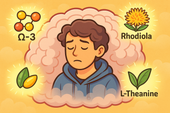
Brain Fog and Body Dysmorphic Disorder: Can Nootropic Supplements Help?
Brain fog often accompanies Body Dysmorphic Disorder, clouding focus and deepening emotional fatigue. Nootropic supplements like L-theanine, Rhodiola, and CoQ10 can help restore mental clarity, balance neurotransmitters, and bring calm energy back to the mind 🌿🧠.
-

How Stress Hormones Like Cortisol May Worsen Body Dysmorphic Disorder
Chronic stress floods the brain with cortisol — the hormone that keeps you on high alert. In Body Dysmorphic Disorder, this chemical overdrive fuels anxiety, distorts self-image, and traps the body in survival mode. Calming cortisol helps restore both peace and perspective 🌿🧠.
-

The Role of Neurotransmitters in BDD—and How Supplements May Help
Neurotransmitters like serotonin, dopamine, glutamate, and GABA shape how people with Body Dysmorphic Disorder perceive themselves. When these brain messengers fall out of balance, perception distorts — but targeted supplements can help restore calm, focus, and emotional regulation 🧠🌿.
-

What Is Body Dysmorphic Disorder? A Deeper Look at the Mind-Body Connection
Body Dysmorphic Disorder (BDD) isn’t just about appearance — it’s about perception. When brain chemistry, trauma, and stress distort self-image, the mind begins to see flaws that aren’t truly there. Healing starts by calming the nervous system and reconnecting mind and body 🪞🧠.
-
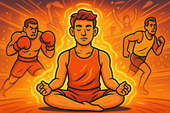
Keeping Calm in Competitive Sports: How to Train Your Mind, Body, and Chemistry for Peak Performance
Competitive pressure can overwhelm even the strongest athletes — but calm is trainable. By combining supplements like magnesium, L-theanine, and adaptogens with breathwork and mindset training, you can stay focused, balanced, and in control under any level of stress 🧠🏅.
-
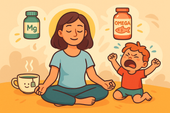
Supplements for Parents Facing Toddler Tantrums: Staying Calm When Little Emotions Run Wild
Toddler tantrums can drain even the most loving parent — but your calm is powerful. With the right supplements like magnesium, L-theanine, and ashwagandha supporting your nervous system, you can stay patient, grounded, and kind, even when emotions run high 🧸🌿.
-

Workplace Stress and Anger Management Support
Workplace stress can quickly turn into frustration — but calm is a skill you can train. By combining supplements like magnesium, L-theanine, and adaptogens with breathwork and mindset tools, you can stay focused, patient, and emotionally grounded no matter how intense the office gets 💼🌿.
-

How to Stay Patient With Family During Stressful Holidays
Holiday gatherings can stir up old stress and test your patience — but calm is possible. With nervous system support from magnesium, L-theanine, and adaptogens, plus mindful breathing and clear boundaries, you can stay centered, kind, and grounded even when family chaos unfolds 🎄💞.
-

Supplements to Keep Calm During Traffic Jams
Getting stuck in traffic doesn’t have to ruin your mood. With calming supplements like magnesium, L-theanine, and ashwagandha, you can train your body to stay relaxed and focused behind the wheel — turning gridlock into a moment of grounded patience 🚗🌿.
-
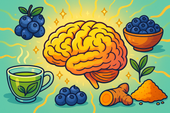
The Role of Antioxidants in Healing Brain Stress from Dissociation
Antioxidants protect the brain from the oxidative stress caused by trauma and dissociation. By neutralizing free radicals and supporting mitochondrial recovery, they help restore clarity, focus, and emotional balance — allowing the mind to heal at the cellular level 🌿🧠.
-
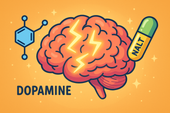
N-Acetyl L-Tyrosine (NALT) for Supporting Mental Clarity
N-Acetyl L-Tyrosine (NALT) fuels dopamine production — the neurotransmitter of focus and motivation. By supporting brain chemistry during stress, NALT helps restore mental clarity, energy, and alertness, making it easier to think clearly and feel present again ⚡🧠.
-

How Ginseng May Improve Focus and Energy in Dissociation
Ginseng helps combat the mental fatigue and fog that often come with dissociation. By supporting mitochondrial energy, balancing neurotransmitters, and regulating cortisol, it gently restores focus, motivation, and emotional presence — helping the mind reconnect with clarity and strength 🌿⚡.
-
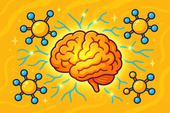
Phosphatidylserine and Dissociation: Supporting Cognitive Function
Phosphatidylserine helps calm the stress response by balancing cortisol, the body’s primary stress hormone. By lowering cortisol spikes, it protects memory, focus, and emotional stability — restoring clarity and mental presence for those struggling with dissociation 🧠🌿.
-
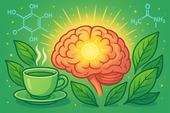
Can Green Tea Extract Help with Dissociative Brain Fog?
Green tea extract may help lift dissociative brain fog by supporting neurotransmitter balance, reducing inflammation, and enhancing energy at the cellular level. With its key compounds EGCG and L-theanine, it promotes calm focus, clarity, and emotional presence — helping you feel more alert and grounded 🍵🧠.
-
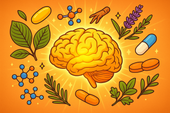
Building a Natural Supplement Stack for Dissociation Support
Building a supplement stack for dissociation means nourishing the brain and body back into communication. By supporting neurotransmitters, gut health, and energy balance through nutrients like magnesium, omega-3s, curcumin, and probiotics, you can help restore clarity, calm, and connection — one layer at a time 🌿🧠.
-

Chamomile and Lavender for Dissociative Anxiety Relief
Chamomile and lavender work together to calm dissociative anxiety by soothing the nervous system and restoring emotional safety. Their natural compounds balance cortisol, enhance GABA activity, and activate the vagus nerve — helping you feel grounded, connected, and at peace again 🌿💜.
-
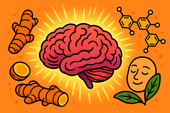
Curcumin for Inflammation and Mental Clarity in Dissociation
Curcumin, the golden compound in turmeric, does more than fight inflammation — it helps clear the mental fog often tied to dissociation. By calming neuroinflammation, balancing neurotransmitters, and supporting mitochondrial energy, curcumin can restore mental clarity, focus, and emotional presence 🌿🧠.
-
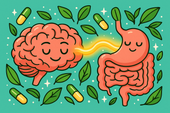
Probiotics and Dissociation: Exploring the Gut–Brain Axis
The gut–brain axis plays a vital role in emotional awareness and presence. When the microbiome is balanced, it supports serotonin production, vagus nerve activity, and calm focus. Probiotics help repair this connection — restoring safety, clarity, and the feeling of truly being in your body again 🌿🧠.
-
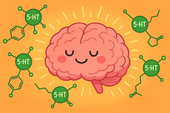
5-HTP for Dissociation: Supporting Serotonin and Emotional Stability
5-HTP helps bridge the gap between emotional numbness and stability by supporting serotonin production — the neurotransmitter that shapes mood, sleep, and sensory awareness. For people experiencing dissociation, 5-HTP may gently restore connection, presence, and emotional balance from the inside out 🌿🧠.
-
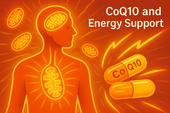
CoQ10 and Energy Support for People with Dissociation
Chronic dissociation often leaves the body running on empty — tired, foggy, and disconnected. CoQ10 helps recharge that system at the cellular level by restoring mitochondrial energy, reducing oxidative stress, and supporting the brain’s capacity to stay present. It’s energy medicine for both body and mind ⚡🧠.

















































